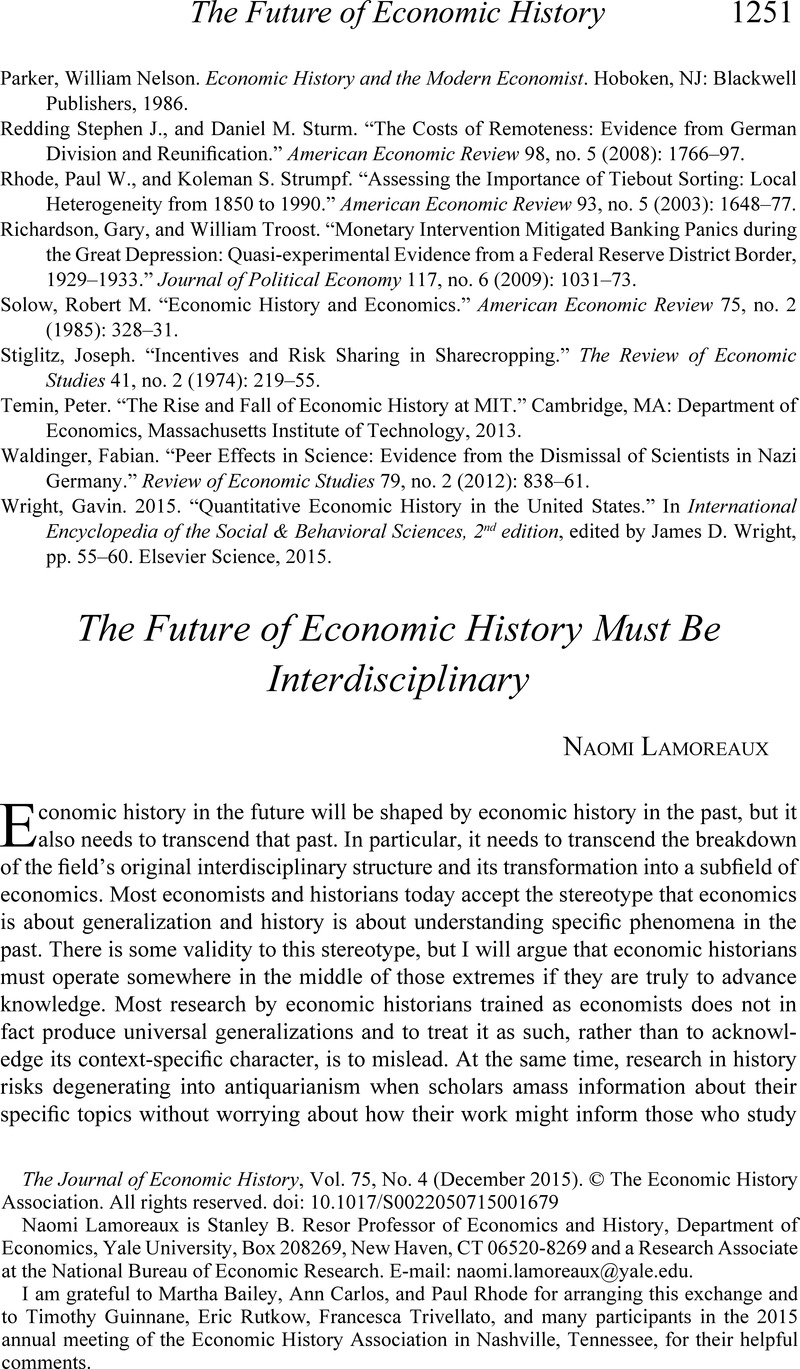Crossref Citations
This article has been cited by the following publications. This list is generated based on data provided by Crossref.
Abramitzky, Ran
2015.
Economics and the Modern Economic Historian.
The Journal of Economic History,
Vol. 75,
Issue. 4,
p.
1240.
Cogneau, Denis
2016.
The Economic History of Africa: Renaissance or False Dawn?.
Annales. Histoire, Sciences Sociales,
Vol. 71,
Issue. 04,
p.
539.
Klein, Herbert S.
2016.
CLAH Lecture: Living with History as a Social Science.
The Americas,
Vol. 73,
Issue. 3,
p.
291.
Cogneau, Denis
2016.
History, Data and Economics for Africa: Can We Get Them Less Wrong?: Reply to Morten Jerven's ‘Trapped between tragedies and miracles: Misunderstanding African economic growth’.
Development Policy Review,
Vol. 34,
Issue. 6,
p.
895.
Cogneau, Denis
2016.
Histoire économique de l'Afrique : renaissance ou trompe-léœil ?.
Annales. Histoire, Sciences Sociales,
Vol. 71,
Issue. 04,
p.
879.
Dherbécourt, Clément
and
Monnet, Éric
2016.
Les angles morts de The Poverty of Clio.
Tracés,
p.
137.
2017.
Debating Methodology in Business History.
Business History Review,
Vol. 91,
Issue. 3,
p.
443.
Segreto, Luciano
2017.
La sfida di "Re Cotone". Una nuova storia del capitalismo attraverso la storia delle commodities?.
PASSATO E PRESENTE,
p.
93.
Antipa, Pamfili
and
Bignon, Vincent
2018.
Où en est l’histoire économique ? Entre narration et quantification.
Revue de l'OFCE,
Vol. N° 153,
Issue. 4,
p.
19.
Seltzer, Andrew J.
and
Hamermesh, Daniel S.
2018.
Co-authorship in economic history and economics: Are we any different?.
Explorations in Economic History,
Vol. 69,
Issue. ,
p.
102.
Cogneau, Denis
2018.
Claude Diebolt et Michael Haupert (dir.) Handbook of Cliometrics Berlin, Springer, 2016, XXII-590 p..
Annales. Histoire, Sciences Sociales,
Vol. 73,
Issue. 4,
p.
969.
Cherrier, Beatrice
and
Svorenčík, Andrej
2018.
The quantitative turn in the history of economics: promises, perils and challenges.
Journal of Economic Methodology,
Vol. 25,
Issue. 4,
p.
367.
Antipa, Pamfili
and
Bignon, Vincent
2019.
Whither Economic History? Between Narratives and Quantification.
Revue de l'OFCE,
Vol. N° 157,
Issue. 3,
p.
17.
Wehrheim, Lino
2019.
Economic history goes digital: topic modeling the Journal of Economic History.
Cliometrica,
Vol. 13,
Issue. 1,
p.
83.
Quinn, William
and
Turner, John D.
2020.
Boom and Bust.
Muguiro, Natalia
2020.
Citations in Interdisciplinary Research Articles.
Michalopoulos, Stelios
and
Papaioannou, Elias
2020.
Historical Legacies and African Development.
Journal of Economic Literature,
Vol. 58,
Issue. 1,
p.
53.
Kim, Seik
and
Lee, Sam-Ho
2020.
Son Preference and Fertility Decisions: Evidence From Spatiotemporal Variation in Korea.
Demography,
Vol. 57,
Issue. 3,
p.
927.
Simson, Rebecca
2020.
Statistical sources and African post-colonial economic history: Notes from the (digital) archives.
Economic History of Developing Regions,
Vol. 35,
Issue. 2,
p.
143.
Frankema, Ewout
2021.
The Handbook of Historical Economics.
p.
557.



